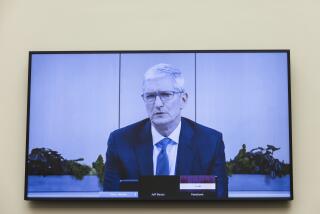Option risk hits Apple stock
- Share via
Shares of Apple Computer Inc. went haywire Wednesday amid fresh reports that the company’s stock options backdating problems could be worse than previously disclosed and possibly ensnare charismatic co-founder Steve Jobs.
News accounts that Apple falsified documents to cover up the backdating of options given to executives drove shares down as much as 6% before they rebounded as investors dismissed the reports and took advantage of lower prices. The stock closed at $81.52, up a penny.
However, in after-hours trading, the shares fell back to $79.05 after a report late in the day suggested that Jobs had received options in 2001 without the required authorization of Apple’s board of directors.
The report, by London’s Financial Times, said that records were falsified to make it appear that the grant of 7.5 million options had been approved by the Apple board. Quoting unnamed people briefed by Apple’s lawyers, the article said federal regulators were weighing the information to determine whether to pursue legal action against the company or individuals.
Apple spokesman Steve Dowling said the Cupertino, Calif.-based maker of Mac computers and iPod media players was providing all the details of its internal investigation into its options practices to the Securities and Exchange Commission.
The SEC is probing about 200 companies for possible backdating, in which the issue date of the options is made to coincide with a low in the stock, producing a larger profit for the holder.
Apple is expected to file restated financial reports with federal regulators this week, after delays caused by the internal investigation. It was unclear Wednesday how much detail would be disclosed about the options irregularities in these filings, which will include Apple’s annual report and third-quarter earnings results.
Apple’s stock began falling Wednesday after a report in the legal publication the Recorder indicated that the firm’s internal probe had turned up doctored documents to cover up the backdating.
Apple disclosed in June that the investigation had uncovered irregularities in option grants made from 1997 through 2001. One such grant, to Jobs, was subsequently canceled and led to no financial gain, Apple said.
In October, Apple reported the results of its three-month investigation, in which outside directors and independent accountants and lawyers reviewed about 650,000 e-mail messages and documents. It found that backdating had occurred on 15 dates and acknowledged that Jobs was aware that favorable grants had been made but unaware of the implications.
Analysts have expressed concern that the options probe could lead to the departure of the renowned Jobs. The computer industry pioneer and Apple co-founder is credited with the company’s resurgence.
“All investors care about is whether Steve Jobs is going to be around,” said Piper Jaffray analyst Gene Munster. He thought there was “less than a 5% chance” that Jobs was involved in falsification of documents.
Jonathan Hoopes, next-generation computer analyst for ThinkEquity Partners, agreed that Jobs’ position was not in jeopardy.
“I have to believe that after three months of vetting this with lawyers, with accountants, with outside counsel, if they had found a smoking gun that was smoking enough to get rid of this guy Steve Jobs, they would have done this at that point,” he said.
Apple’s own statement this fall pointed responsibility at two former -- but unnamed -- officers in connection with the accounting, recording and reporting of option grants. Fred Anderson, the company’s former chief financial officer, resigned from the board the day the results of the internal probe were made public. Apple’s former general counsel, Nancy Heinen, left in the spring.
“Nancy Heinen has a rock solid, long-standing reputation as a person of high integrity and honesty,” said her attorney, Cristina Arguedas. “Any rumor and innuendo to the contrary is absolutely without foundation.”
Even if the SEC investigation finds no evidence of intentional wrongdoing, Jobs could face a board that’s skittish about the personal liability that members face under Sarbanes-Oxley, the corporate governance law Congress passed in 2002.
“I’ve been surprised at other CEOs who have fallen on the sword under pressure from boards that were afraid of personal liability,” said an Apple shareholder. He cited the October resignation of Shelby Bonnie, CEO of CNet Networks.
“Investors liked him. The board liked him. There was no evidence he was involved. And yet he resigned.”
*
alex.pham@latimes.com






